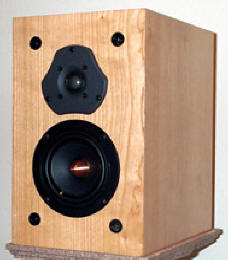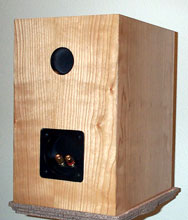You are reading the older HTML site
Positive Feedback
ISSUE
20
july/august
alegria audio
Ling loudspeakers
as reviewed by Ed Kobesky

|
ED KOBESKY'S SYSTEM
LOUDSPEAKERS
ELECTRONICS
SOURCES
CABLES
ACCESSORIES
|
Timothy Forman, the man behind Alegria Audio, must be nuts. His first product offering, the Ling loudspeaker, is priced just under $400 a pair. At first glance, that seemed about right. Then I looked closely–and listened closely—to these lovely mid-size monitors, and realized that his profit margin must be virtually nonexistent. I grilled him to find out where he cut corners, but as it turns out, he didn't.
"It's primarily a labor of love," he said of his part-time enterprise, shrugging off any suggestion that he's working for peanuts. "To save money, I farm out the cabinet work." Not to China, but to an American woodshop. While the cabinets are not quite up to the standards of the ProAc Tablette 2000s, speakers the Lings resemble both sonically and aesthetically, they're certainly pretty, with real wood veneer both inside and out. Dead giveaways to their homegrown roots are the low-tech mousehole port on the rear, a not-quite-perfect cutout for the speaker terminals, and the absence of a logo on the front grilles.
Pop off those grilles and you're confronted with some pretty formidable looking drivers. The "woofers" are 4.5-inch, full-range units from Canada's Creative Sound Solutions that employ paper cones, rubber surrounds, and copper phase plugs. They're intended more for the SET set (pardon the pun), and function very well in this application, putting out bass so deep and tight it's shocking. They cost $138 all by themselves. The supertweeters are sourced from Fostex—20mm soft domes set into compact nylon resin frames that absorb resonance while allowing close placement of the bass driver.
"The Ling is in the smallest enclosure that this driver will work acceptably in," Tim explained via e-mail. "It uses a first-order crossover up around 10kHz," which he said helps achieve his design goal of keeping the crossover "completely out of the midrange band or [at least with] very steep slopes." R&D was performed using the Praxis 2 measuring system and LspCAD. The result, which somewhat lacks the top-to-bottom cohesiveness that only big-buck research facilities can provide, is still remarkably well integrated, with well-chosen compromises.
The tweeters have a ton of sparkle, which was disconcerting at first. The sound was not unpleasant, but not nearly as seamless as that of the Mission M31 speakers I'd been using earlier that day. I fired off a message to Tim, wondering whether some serious break-in was in order, but I wish I hadn't been so hasty. During the next few days, I became quite fond of the Lings' silky treble response, particularly the stunning amount of top-end detail. The M31s now sound dull by comparison.
Where the Lings really excel is in soundstaging. They're among the two or three best $400 speakers I've ever heard in this respect, creating an image that extends well beyond their modest dimensions. It was easy to imagine Wynton Marsalis standing near center stage, fronting the orchestra on Tomasi's Concerto For Trumpet and Orchetra (CBS LP IM42096). The width and depth of the soundstage continued to amaze me throughout my listening, regardless of genre.
 I didn't even have to apply the rule of
thirds to obtain this level of performance. The Lings were situated
about seven feet apart and just eighteen inches from the rear wall. I
generally expect monitors to come out a few feet, maybe three or four,
to achieve a similar disappearing act, but the tradeoff is a midrange
that lacks the same dramatic presence as the rest of the spectrum. The
Lings' relatively soft rendering of vocals reminded me of the air and
space of expensive moving coil cartridges. It wasn't distracting—it's
just what happens when you add a supertweeter and a crossover to a
driver that is intended to be used full range. The effect could be
somewhat alleviated with a more forward placement, but at the expense of
limited bass response. I found the compromise easy to ignore.
I didn't even have to apply the rule of
thirds to obtain this level of performance. The Lings were situated
about seven feet apart and just eighteen inches from the rear wall. I
generally expect monitors to come out a few feet, maybe three or four,
to achieve a similar disappearing act, but the tradeoff is a midrange
that lacks the same dramatic presence as the rest of the spectrum. The
Lings' relatively soft rendering of vocals reminded me of the air and
space of expensive moving coil cartridges. It wasn't distracting—it's
just what happens when you add a supertweeter and a crossover to a
driver that is intended to be used full range. The effect could be
somewhat alleviated with a more forward placement, but at the expense of
limited bass response. I found the compromise easy to ignore.
The Lings do a remarkable impression of floorstanding full-range speakers. They'll be music to the ears of anyone who wants big-box sound in a small room. Their bass tightness might be slightly overpowering in truly tiny spaces, but it could never be considered sloppy or boomy. On No Doubt's Rock Steady (Interscope LP 069493157-1), the thumping "Hella Good" nearly shook loose a few of my fillings. Sounds of Soweto, a long-forgotten sampling of 1980s South African pop (EMI LP EN5006), is decidedly low-fi in parts, yet the Lings managed to find a surprising amount of air between the funky beats.
That leads me to make an obvious recommendation for the Lings—home theater. Hitched to my Sony GX49ES stereo receiver, these shielded monitors made an outstanding case for a simple two-channel movie setup. Think you need a center channel? Think again. The Lings made me believe that dialogue was coming directly from in front of the TV, and their bass performance was positively room-rattling. For those so inclined, a full five-channel setup would come in at the absurdly low price of $1000.
There's nothing particularly remarkable about the Lings. Tim Forman applied a proven formula—high-quality drivers, solid cabinets, and a simple crossover. The magic results more from his blood and sweat than the parts themselves. These speakers weren't designed by committee, and they're better for it. In a marketplace full of hi-fi bargains, the Alegria Audio Lings emerge as one of the most intriguing I‘ve run across. They're smooth, refined, and involving in a way that belies their price. With some added polish, I'd expect to pay three times that.
The Lings are handsome, if nondescript. They are of high quality, and throw an immense soundstage that rivals the best I've heard. I prefer to think of them as not homemade, but craft-brewed. The rough edges are easily forgivable considering their tremendous value. Do you want something truly special, an heirloom product at a mass-market price? Get to the nearest phone and order a pair of these right away, before Timothy Forman either raises his prices or gets sick of working for peanuts. Ed Kobesky
Ling loudspeakers
Retail: $399 a pair
Alegria Audio
web address:
www.us.alegriaaudio.com
